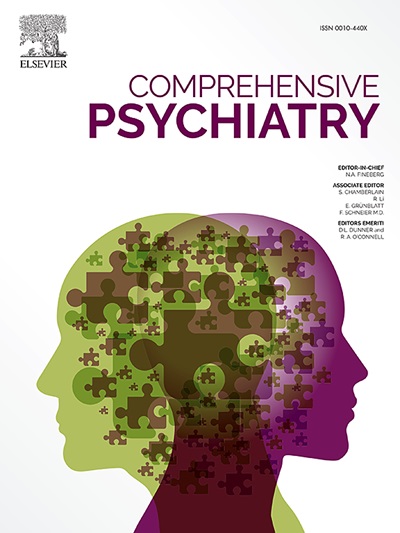Flowers for Algernon: How metacognition affects quality of life in schizophrenia. Structural equation modeling with the FACE-SZ cohort
IF 4.2
2区 医学
Q1 PSYCHIATRY
引用次数: 0
Abstract
Background and hypothesis
We examined the association between metacognitive performance, functioning, and quality of life (QoL) in schizophrenia using structural equation model analyses.
Study design
A sample of 249 participants was assessed for symptoms, functioning, QoL, and both objective and subjective cognitive performance. Metacognitive performance was defined as the adequation between objective and subjective measures of cognitive performance.
Study results
Our model showed an excellent fit (CFI = 0.981; RMSEA = 0.014–0.081) and explained 53.3 % of the variance in functioning and 50.3 % in QoL. Metacognitive performance was not significantly associated with functioning but showed a negative association with QoL (β = −0.383, p < 0.001). Thus, a greater underestimation of one's cognitive abilities was linked with lower QoL, potentially reflecting heightened awareness of deficits that affect well-being. Depression, also negatively associated with QoL (β = −0.359, p < 0.001), was linked to the underestimation of cognitive abilities, whereas symptom severity was associated with their overestimation (β = −0.296, p < 0.001). Complementary analyses suggest that the subjective cognition model closely mirrors that of metacognitive performance, questioning the distinctiveness of metacognition as an explanatory factor in schizophrenia outcomes.
Conclusion
Our findings imply that interventions that boost confidence in cognitive abilities, such as cognitive remediation, may improve QoL. Future research should investigate the causal pathways between these factors and explore the role of social cognition, often impaired in schizophrenia, as another mediator. Comprehensive treatment that addresses clinical symptoms, depression, and subjective cognition challenges appear essential to improve outcomes in schizophrenia.
阿尔杰农之花:元认知如何影响精神分裂症患者的生活质量。FACE-SZ队列结构方程建模
背景与假设我们使用结构方程模型分析精神分裂症患者的元认知表现、功能和生活质量之间的关系。研究设计对249名参与者的症状、功能、生活质量以及客观和主观认知表现进行了评估。元认知表现被定义为认知表现的客观和主观测量之间的适当性。研究结果模型拟合良好(CFI = 0.981;RMSEA = 0.014-0.081),解释了53.3%的功能差异和50.3%的生活质量差异。元认知表现与功能无显著相关,但与生活质量呈负相关(β = - 0.383, p <;0.001)。因此,对一个人的认知能力的严重低估与较低的生活质量有关,这可能反映了对影响幸福感的缺陷的高度认识。抑郁与生活质量也呈负相关(β = - 0.359, p <;0.001),与认知能力的低估有关,而症状严重程度与认知能力的高估有关(β = - 0.296, p <;0.001)。补充分析表明,主观认知模型密切反映了元认知表现,质疑元认知作为精神分裂症结局解释因素的独特性。结论增强认知能力自信的干预措施,如认知修复,可以改善患者的生活质量。未来的研究应该调查这些因素之间的因果关系,并探索社会认知的作用,通常在精神分裂症中受损,作为另一个中介。针对临床症状、抑郁和主观认知挑战的综合治疗似乎对改善精神分裂症的预后至关重要。
本文章由计算机程序翻译,如有差异,请以英文原文为准。
求助全文
约1分钟内获得全文
求助全文
来源期刊

Comprehensive psychiatry
医学-精神病学
CiteScore
12.50
自引率
1.40%
发文量
64
审稿时长
29 days
期刊介绍:
"Comprehensive Psychiatry" is an open access, peer-reviewed journal dedicated to the field of psychiatry and mental health. Its primary mission is to share the latest advancements in knowledge to enhance patient care and deepen the understanding of mental illnesses. The journal is supported by a diverse team of international editors and peer reviewers, ensuring the publication of high-quality research with a strong focus on clinical relevance and the implications for psychopathology.
"Comprehensive Psychiatry" encourages authors to present their research in an accessible manner, facilitating engagement with clinicians, policymakers, and the broader public. By embracing an open access policy, the journal aims to maximize the global impact of its content, making it readily available to a wide audience and fostering scientific collaboration and public awareness beyond the traditional academic community. This approach is designed to promote a more inclusive and informed dialogue on mental health, contributing to the overall progress in the field.
 求助内容:
求助内容: 应助结果提醒方式:
应助结果提醒方式:


